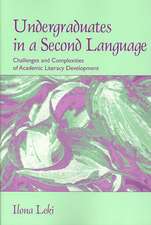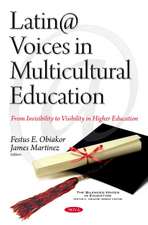Language Policy Challenges in Multi-Ethnic Malaysia: Multilingual Education, cartea 8
Autor Saran Kaur Gillen Limba Engleză Paperback – 17 sep 2016
| Toate formatele și edițiile | Preț | Express |
|---|---|---|
| Paperback (1) | 773.89 lei 6-8 săpt. | |
| SPRINGER NETHERLANDS – 17 sep 2016 | 773.89 lei 6-8 săpt. | |
| Hardback (1) | 779.71 lei 6-8 săpt. | |
| SPRINGER NETHERLANDS – 8 ian 2014 | 779.71 lei 6-8 săpt. |
Din seria Multilingual Education
- 18%
 Preț: 902.36 lei
Preț: 902.36 lei - 18%
 Preț: 956.81 lei
Preț: 956.81 lei - 18%
 Preț: 953.65 lei
Preț: 953.65 lei - 18%
 Preț: 836.29 lei
Preț: 836.29 lei - 15%
 Preț: 638.24 lei
Preț: 638.24 lei - 20%
 Preț: 567.32 lei
Preț: 567.32 lei - 20%
 Preț: 566.76 lei
Preț: 566.76 lei - 20%
 Preț: 569.86 lei
Preț: 569.86 lei - 15%
 Preț: 649.87 lei
Preț: 649.87 lei - 15%
 Preț: 645.28 lei
Preț: 645.28 lei -
 Preț: 394.87 lei
Preț: 394.87 lei - 15%
 Preț: 643.84 lei
Preț: 643.84 lei - 15%
 Preț: 643.34 lei
Preț: 643.34 lei -
 Preț: 389.49 lei
Preț: 389.49 lei - 15%
 Preț: 704.36 lei
Preț: 704.36 lei - 20%
 Preț: 555.53 lei
Preț: 555.53 lei - 18%
 Preț: 953.65 lei
Preț: 953.65 lei - 18%
 Preț: 952.26 lei
Preț: 952.26 lei - 15%
 Preț: 646.43 lei
Preț: 646.43 lei - 15%
 Preț: 585.40 lei
Preț: 585.40 lei - 18%
 Preț: 787.15 lei
Preț: 787.15 lei - 18%
 Preț: 1009.22 lei
Preț: 1009.22 lei - 18%
 Preț: 948.92 lei
Preț: 948.92 lei - 15%
 Preț: 649.22 lei
Preț: 649.22 lei - 18%
 Preț: 1113.39 lei
Preț: 1113.39 lei - 15%
 Preț: 644.95 lei
Preț: 644.95 lei - 15%
 Preț: 634.68 lei
Preț: 634.68 lei - 15%
 Preț: 644.63 lei
Preț: 644.63 lei -
 Preț: 388.90 lei
Preț: 388.90 lei - 15%
 Preț: 647.27 lei
Preț: 647.27 lei - 15%
 Preț: 641.85 lei
Preț: 641.85 lei - 15%
 Preț: 635.80 lei
Preț: 635.80 lei
Preț: 773.89 lei
Preț vechi: 943.77 lei
-18% Nou
Puncte Express: 1161
Preț estimativ în valută:
148.08€ • 161.36$ • 124.78£
148.08€ • 161.36$ • 124.78£
Carte tipărită la comandă
Livrare economică 24 aprilie-08 mai
Preluare comenzi: 021 569.72.76
Specificații
ISBN-13: 9789402403046
ISBN-10: 9402403043
Pagini: 139
Ilustrații: XV, 124 p. 1 illus.
Dimensiuni: 155 x 235 x 8 mm
Greutate: 0.21 kg
Ediția:Softcover reprint of the original 1st ed. 2014
Editura: SPRINGER NETHERLANDS
Colecția Springer
Seria Multilingual Education
Locul publicării:Dordrecht, Netherlands
ISBN-10: 9402403043
Pagini: 139
Ilustrații: XV, 124 p. 1 illus.
Dimensiuni: 155 x 235 x 8 mm
Greutate: 0.21 kg
Ediția:Softcover reprint of the original 1st ed. 2014
Editura: SPRINGER NETHERLANDS
Colecția Springer
Seria Multilingual Education
Locul publicării:Dordrecht, Netherlands
Cuprins
Foreword.- Preface.- Acknowledgement.- 1: Introducing the situational context, macro-sociolinguistics and key elements of language planning and policy in Malaysia.- 2: Language, nation-building and identity formation in a multi-ethnic society.- 3: The role of language education during colonial rule and post-independence period.- 4: Drastic change in the medium of instruction: From Bahasa Malaysia to English.- 5: The re-reversal from English to Bahasa Malaysia.- 6: The Impact of the change in medium of instruction in Malaysia on the Chinese community and mother-tongue education.- 7: The revival of a minority language in Malaysia: The dynamics between national linguistic ideology and ethnic linguistic identity.- 8: Conclusion: The road ahead for Malaysia: Balancing ethnic, national and international identities.- References.
Textul de pe ultima copertă
Set in Malaysia, this book encompasses language and cultural policy challenges that many other multi-ethnic nations currently have to address. The people of Malaysia constitute a diverse ethnic, linguistic and cultural population, and one of the continuing challenges is the development and establishment of the Malaysian people’s ethnic, national and global cultural identities. This challenge is evident in the journey of language and cultural policy from the post-independence period to the 21st century; a period of over 50 years. The book highlights political, socio-cultural, economic and knowledge economy factors as they impact on decisions made by the government with regard to language policy in the various educational systems. It examines decisions made on the selection of the national language, the medium of instruction in educational systems, the varying changes in language policy for the field of science and technology and the maintenance and sustenance of minority languages.
Caracteristici
Deals with language policy, educational policy and nation building in multi-ethnic societies, framed by practical experience in one of Asia’s most ethnically diverse countries, Malaysia Highlights political, socio-cultural, economic and knowledge economy factors and their impact on government decisions with regards to language policies and education Examines the dynamic tension between national collective identity and ethnic identity in majority and minority ethnic groups Includes supplementary material: sn.pub/extras










